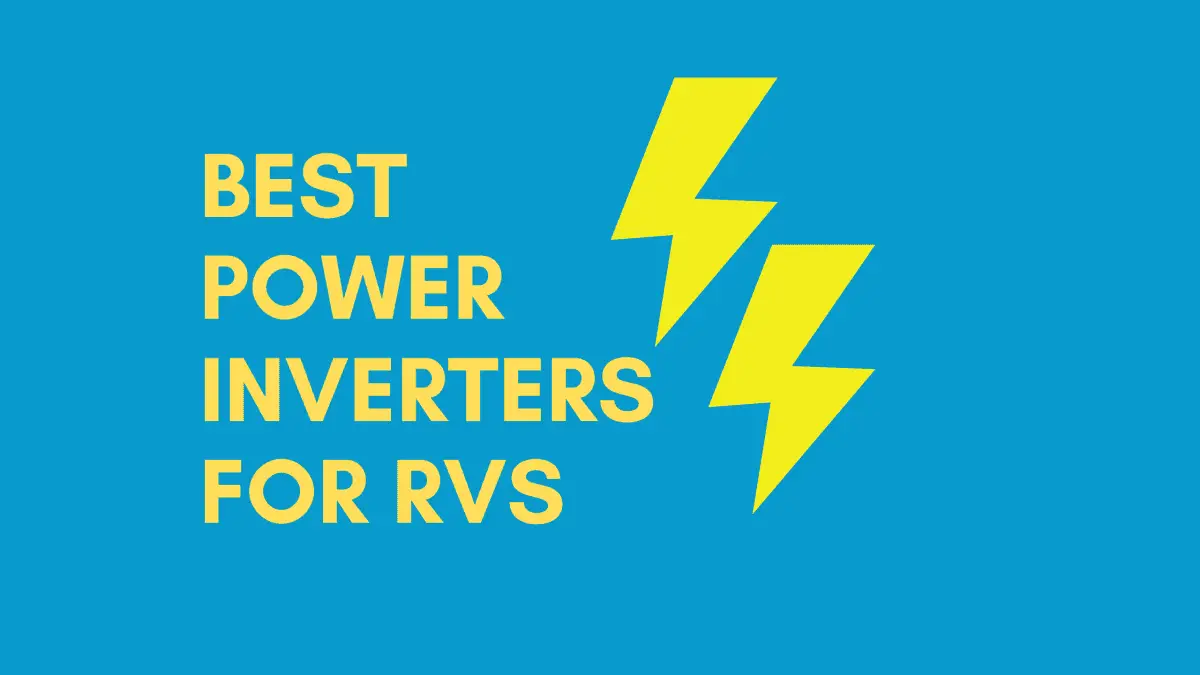After researching 6 products, we found the AIMS Power 3,000-Watt model to be the best power inverter for RVs and travel trailers.
When we first got serious about RVing, we didn’t realize that we couldn’t plug my electronic devices right into the camper’s outlets. To do this, I needed an RV power inverter to redirect the current.
How does this work? Put simply, the RV inverter takes the current from the battery of the travel trailer, then converts it to an alternating current. That way, you know it’s safe to plug in your devices without worrying about them getting fried.
1. AIMS Power PICOGLF30W12V120VR 3,000-Watt Pure Sine Inverter –Best Overall
2. WindyNation Vertamax 3,000-Watt Pure Sine Wave Inverter -Best for Sensitive Appliances
3. Go Power! GP-SW3000-12 Pure Sine Wave Inverter -Best for Multiple Appliances
4. KRIËGER 3000-Watt 12V Inverter -Best Budget Option
5. AIMS Power 300 Watt Modified Sine Wave -Best Modified Sine Wave Inverter
6. Xantrex 81201012 Inverter -Best Temperature Compensation
As you may have noticed, AIMS turns up more than once on our list. However, their 3000 Watt Pure Sine Inverter is our top pick. It delivers 3000 watts of continuous energy, but is capable of 9000-watt surges for intervals up to 20 seconds. That makes charging your devices a snap, no matter where you’re parked.
Read on to find out more about our number one choice, along with the other products we tested.
Best RV Power Inverters For RVs And Travel Trailers-Reviews
Our Top Pick
1. AIMS PICOGLF30W12V120VR 3000 Watt Pure Sine Inverter—Best Overall
This product offers a number of useful features, including short circuit and high voltage protection, auto-gen start, GFCI outlet, and a cooling fan to prevent overheating.
You only need one set of cables in order to hook it up, and the company offers optional remotes as well. We would highly recommend using the remote, as it allows you to access the unit without going to the control panel every time.
AIMS has been in business for over two decades, and offers outstanding technical support if you run into problems. In our experience, however, that’s not likely to be an issue. We would highly recommend this inverter for your RV or travel trailer.
2. WindyNation Vertamax 3,000-Watt Pure Sine Wave Inverter—Best For Sensitive Appliances
This is another pure sine inverter that offers three outlets and an LED digital display that helps you monitor battery voltage and overall usage. Each outlet has its own circuit breaker and easily identifiable red switch. You can use this device for computers, TVs, air conditioners, microwaves, video game consoles, cell phone chargers, and more.
The WindyNation Vertamax is equipped with a 1-year warranty. Also included are reverse polarity protection, a voltage alarm, and thermal shutdown mode.
3. Go Power! GP-SW3000-12 Pure Sine Wave Inverter—Best For Multiple Appliances
You can identify this RV inverter by its bright yellow color, which makes it easy to find when you need to adjust the controls. Like our top pick, this offering is a 3000-watt continuous pure sine wave inverter with 12-volt input. It features two GFCI protected outlets and a hardwire port, so it can easily be used for multiple appliances.
Overload, over-voltage, and under-voltage protections are all built in, so you’ll have peace of mind when using this unit. The company also includes a 2-year warranty with the purchase price.
4. KRIËGER 3000-Watt 12V Inverter—Best Budget Option
In addition to being one of the most affordable travel trailer inverters on our list, this is also one of the most compact. Despite its small size, it can provide energy to air conditioners, appliances, TVs, and other devices while you’re on the road.
The LCD display is legible even from a distance, and allows you to track the output wattage as well as the input voltage. Its portable nature, coupled with the fact that it runs more quietly than most units we’ve seen, makes this a highly unobtrusive and capable device. It also comes with a 3-year warranty to protect against defects.
5. AIMS Power 300 Watt Modified Sine Wave—Best Modified Sine Wave Inverter
The dual CFCI outlet on this modified sine wave RV inverter offers superb protection to appliances and electronic devices. You can also connect directly to the AC terminal block to direct the 3,000 watts of energy to a single source.
The unit is lightweight and easy to use, with an efficient built-in thermal cooling fan. If you’re looking for a backup energy source for your RV, this could be the perfect fit. However, be forewarned that some users have complained about the inverter’s longevity, claiming that it stopped working after the first year.
6. Xantrex 81201012 Inverter—Best Temperature Compensation
Buyers who are looking specifically for an RV power inverter that supports temperature compensation should consider this one from Xantrex. With the 81201012 model, you won’t have to worry about over- or under-heating the way you would with a lesser unit.
Xantrex has also designed this model to be easily customizable, so it’s a good fit for beginners and tech-minded shoppers alike. It has a high surge capability and an impressive output of 2,000 watts—though this output puts it slightly below most of the competition.
The inverter carries a relatively high price tag. However, the company’s reputation for quality ensures that it should last long enough to make the investment worthwhile.
Buying Guide
When you’re shopping for an RV power inverter, you want to choose carefully. Here are some of the key features and benefits to be aware of before you begin your search.
Features To Look For
Type
There are several different types of RV inverter to choose from. Here’s a brief rundown on each one.
Sine Wave
This version is quite popular, particularly with utility companies. Most appliances and equipment can be used with a sine wave RV inverter, so it offers peace of mind in addition to being easy to find. In fact, some appliances, such as microwaves, will only produce their full output with this type of RV power inverter.
Be forewarned that this is the most expensive type of inverter on our list. Its positive qualities help to make it worth the investment, but you can expect to spend twice as much on a sine wave model than you would for another type.
Modified Sine Wave
A modified sine wave RV power inverter uses a waveform current, which makes it compatible with most electronic equipment.
One unfortunate side effect, however, is that it may cause a reduction in efficiency for the attached devices. This means that your appliance’s motors might consume more energy to make up the difference. In point of fact, this type of RV inverter can cannibalize up to 20 percent more energy than a sine wave device.
Moreover, modified sine wave inverters are generally louder than the competition. While the difference is slight, it’s worth mentioning if you’re looking specifically for a quiet power inverter for your travel trailer.
Square Wave
This is the least popular type of inverter listed here, but it’s also the least expensive. It’s not as capable as the others, as its usefulness is limited to simple tools with universal motors. You’re far more likely to find a sine wave or modified sine wave inverter than a square wave model—and you’ll get more use out of it, too.
Efficiency
Look for the most efficient model you can find—that is, one that won’t cause a noticeable increase in your energy consumption. If your power inverter isn’t energy efficient, it won’t be worth the cost.
Wattage
You’ll need to familiarize yourself with two important terms when deciding what size inverter to buy: surge and wattage.
The surge, or peak power, is the maximum amount of energy that the inverter can supply. It can run on the surge level for only a short period—usually no more than 15-20 minutes. Devices with electric motors often require a high startup surge, so keep this in mind when deciding.
The terms usual and typical refer to the energy that’s fed continuously into the devices from the power inverter. As such, it’s far lower than the surge. It may also be called the continuous rating.
Voltage
You should also familiarize yourself with the inverter’s input and output voltage. These will help you determine whether the unit is compatible with your RV.
In order to work, the RV power inverter needs to be in line with the battery that’s providing it with its energy source. Therefore, a 12V battery would work with a 12V DC RV inverter.
The AC, or output voltage, is another factor to consider. If your devices were purchased in the US, Canada, or Mexico, they probably use 120V AC power. Devices from other parts of the world, meanwhile, might use 220V to 250V AC.
Benefits
Using an RV power inverter can be beneficial in many ways. For one thing, they’re more efficient than gas-powered generators. This means you can enjoy all the comforts of home when you’re traveling in your RV. It’s especially true of pure sine wave inverters, which operate at a higher level than their modified sine wave counterparts.
There’s also no need to buy gasoline or any other type of fuel when you use this type of inverter. It harnesses the energy from your RV’s existing battery, which means less hassle. It also makes less of a mess and frees up valuable space in your rig.
Finally, RV inverters make very little noise. When you compare them to generators, which can be loud enough to wake the entire campground, this is a great perk.
In Conclusion
With the right RV power inverter, you can relax and enjoy your camping trip knowing that you’ll have plenty of energy to fuel your appliances. Once you’ve had a chance to learn about the different types, it will be easy to choose one that works for you.
Our top pick from AIMS covers all the bases, which is why we think you’ll be pleased with it. Easy to install, even simpler to use, it makes life on the road a breeze, even if you have multiple appliances to hook up.
Best of luck, and happy camping!
Check out our article on: Best RV Surge Protector For 2021 (30 and 50 AMP)

